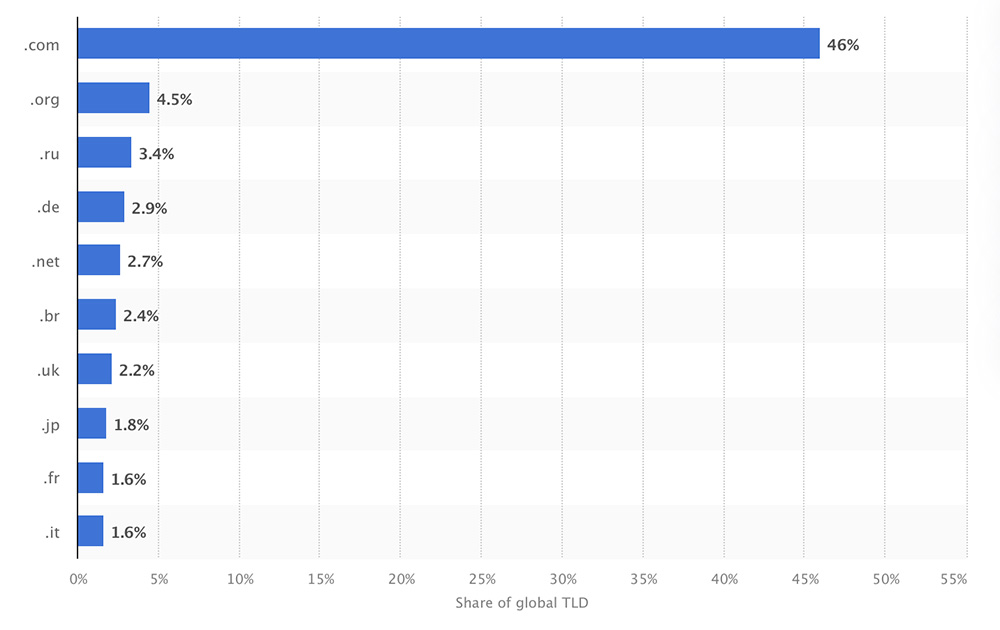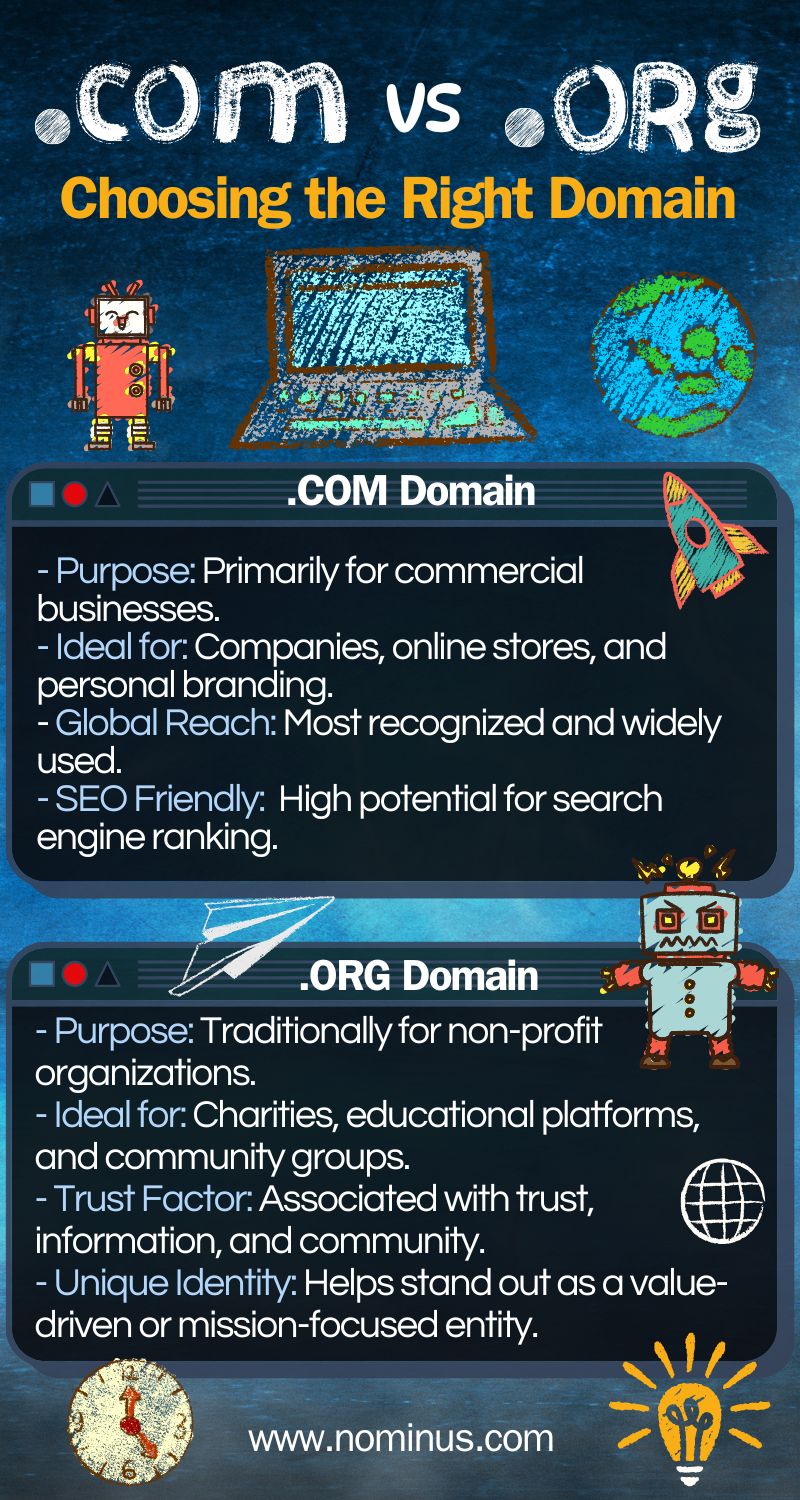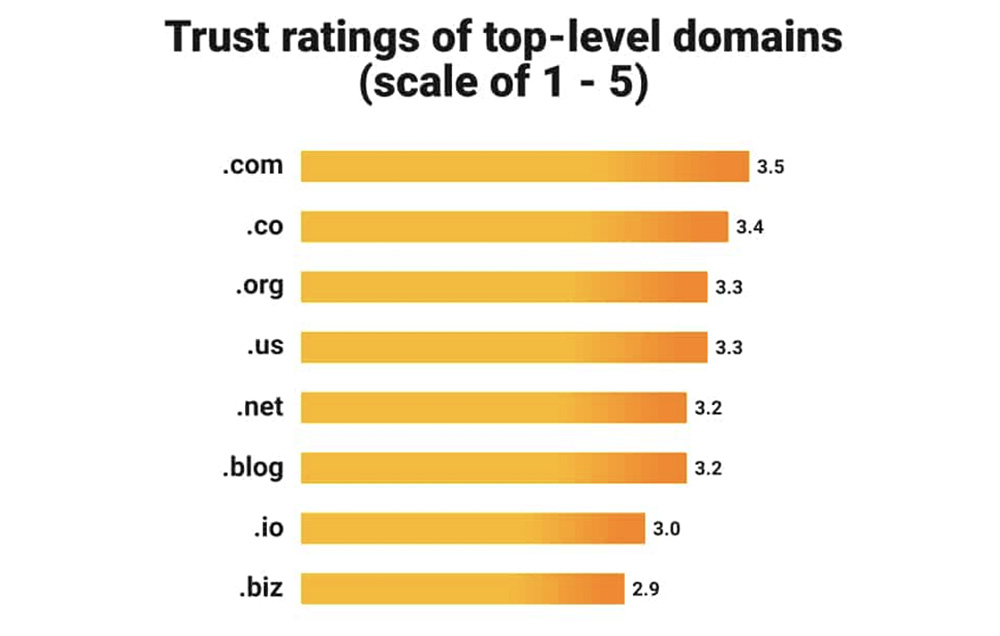.COM or .ORG Which to Choose for Your Website
Table of Content
Introduction
Understanding Domain Name Extensions
What is .COM?
What is .ORG?
.COM or .ORG - Making Tough Choices
What are the Key Differences?
Practical Considerations and Recommendations
Registering a Domain Name
Conclusion
Introduction
As the digital landscape continues to evolve, the choice of domain extension stands as a crucial milestone in defining your website's identity and purpose. Recent statistics, as of December 2023, revealed that the .com top-level domain (TLD) continues to hold by far the largest share of websites, commanding approximately 46 percent of the global total. Trailing by a considerable distance, the .org TLD accounted for only 4.5 percent. That's approximately 170 million .com versus around 11 million .org websites!
The .com domain, with its longstanding presence since the early days of the world wide web is almost synonymous with the internet itself. Think of the .com bubble or the giants of the web such as Amazon.com, Google.com, Facebook.com. These websites leverage .com extensions to solidify their positions in online commerce, search, and social networking, showcasing the primary role of .com domains in facilitating commercial activities on the web. However, their primary focus remains on commercial ventures, so it's important to contextualize the dominance of .com in light of .org domains' distinct positioning and objectives. Traditionally catering to nonprofit organizations and advocacy groups, the latter serves a much narrower but dedicated audience.
In this blog, we'll explore the strategic considerations behind choosing a .com or .org website domain. We'll look at some case examples to illustrate potential scenarios. And we'll break down the pros and cons of each. Rather than solely focusing on popularity, the decision should be rooted in the unique objectives and target audience of your website and brand. Whether your goal is to achieve commercial success or drive social impact, selecting the right domain extension is a critical step that must align with the overarching goals and values of your organization. By understanding the distinct advantages and implications of .com and .org domains, you can make an informed decision that best serves your website's purpose and resonates with your audience.
1. Understanding Domain Name Extensions:
Your website's address serves as its digital identity, comprising both its name and its extension, such as .org or .com. This combination not only directs visitors to your online presence but also shapes their perception of your brand. A memorable domain extension enhances brand visibility and credibility, making it crucial for businesses aiming to stand out in the crowded online landscape.
With such a plethora of options available, it can often be somewhat of a labyrinthine task to choose the right one! Often, we end up grabbing a series of different extensions, just in case, without having defined which one might best resonate with our particular audience.
Each top-level domain (TLD) carries its own connotations and resonates with distinct audiences. Let's briefly explore the primary ones to gain a clearer understanding of their significance and global popularity.
-
.com (170m) holds the title as the most recognized and widely used domain extension. Derived from "commercial," it symbolizes a strong online presence for businesses, offering credibility and trustworthiness.
-
.org (11m), originally intended for non-profit organizations, now represents purpose-driven entities, from community groups to advocacy organizations, conveying a sense of mission and social responsibility.
-
.net (13.2m) stands out as a beacon of innovation and connectivity for those in the tech sphere, catering to businesses and individuals involved in technology and networking.
-
.info (4m) serves as a digital hub for sharing knowledge and resources, making it ideal for educational content and informational websites, promoting transparency and authenticity.
 Figure 1. Most popular top-level domains worldwide. Source: Statista, December 2023.
Figure 1. Most popular top-level domains worldwide. Source: Statista, December 2023.
While the options are diverse, undoubtedly .com remains the undisputed leader in top-level domains worldwide. It exudes familiarity, credibility, and trust, making it the go-to choice for businesses seeking to establish a strong online presence.
2. What is .COM?
The .com domain, a key part of the internet's addressing system, has a rich history dating back to its inception in 1985. Originally intended for commercial entities, it quickly expanded to include a wide range of uses. Initially overseen by the U.S. Department of Defense, it's now managed by Verisign under U.S. law. The .com domain skyrocketed in popularity during the dot-com bubble of the late 1990s, becoming the go-to choice for businesses and organizations worldwide. Today, millions of websites use .com addresses, making it a staple of the online landscape and a symbol of the internet's evolution and commercial potential. And despite facing two quarters of decline in 2022, .com has retained its stronghold with a massive 170.2 million websites registered under this extension in 2024.
Nevertheless, in 2023, a notable shift occurred in the global domain name market as the .com domain, long synonymous with online presence, ceded its popularity to newer top-level domains (TLDs) and subdomains that offer greater flexibility and relevance. In the same year, these emerging TLDs such as .fashion, .travel, .shop, .design, and .cloud had collectively amassed around 31 million registrations, catering to specific industries, communities, or themes, and empowering website owners to craft more distinctive and memorable online identities.
3. What is .ORG?
The .org domain, introduced in 1985 as one of the original domain extensions, is a generic top-level domain (gTLD) intended primarily for nonprofit entities such as NGOs, charitable organizations, and educational platforms. It was initially designated for organizations not aligning with existing domain categories and is regarded as a more robust and trustworthy alternative to more recent options.
Yet in 2019, the .org top-level domain, traditionally synonymous with nonprofits and nongovernmental organizations seeking a credible online presence, faced a significant transition when the Public Interest Registry (PIR), which oversees .org domains, was set to be acquired by the private equity firm Ethos Capital. Nevertheless, following widespread concerns and opposition from various stakeholders, including charities and non-profit organizations, the proposed sale was blocked. Rumored to be around $1 billion, the potential sale raised concerns among various organizations, including charities and nonprofits, who feared that a for-profit owner might exploit the domain for financial gain, compromising the integrity and affordability of .org domains, and posing financial challenges for charities and NGOs. The rejection of the proposed transfer by the governing body marked a significant victory for non-profits, preserving the status quo and ensuring continued accessibility and affordability of .org domains for mission-driven organizations.
Despite the attempted change in ownership, the strong public perception continues to associate .org with nonprofit endeavors. Thus, while for-profit entities have the legal option to acquire .org domains, they still risk facing backlash and accusations of misrepresentation if their commercial nature is not transparently disclosed.
4. .COM or .ORG - Making Tough Choices
Deciding between a .com or .org domain, or any other extension for that matter, is pivotal for shaping your online identity. In the following case studies, we examine some possible strategic dilemmas entrepreneurs might encounter when making this choice. From balancing commercial goals with social impact, to establishing trust in niche communities, these scenarios highlight the complexities of digital branding and the quest for authenticity amidst competing priorities.
-
Sustainable Fashion Hub: Perhaps you are an entrepreneur deeply committed to sustainable fashion and environmental activism. As you embark on creating a website to champion eco-friendly clothing brands and advocate for environmental causes, you're confronted with the dilemma of choosing between a .com and a .org domain. While a .com domain holds promise in attracting a wider audience and potentially generating revenue through e-commerce, there's a concern that it might overshadow your sustainability message with commercial interests. Conversely, a .org domain resonates with your activism but may confine your reach primarily to nonprofit spheres.
-
Educational Platform: Imagine yourself as an educator driven by the mission to provide accessible tutoring services to disadvantaged students. As you contemplate the domain for your online tutoring platform, you're faced with the choice between a .com and a .org extension. Opting for a .com domain could project professionalism and broaden your audience, potentially enhancing revenue streams through paid tutoring sessions. However, there's a risk of overshadowing your educational mission with commercial motives. Conversely, a .org domain underscores your commitment to education and community service but may inadvertently limit your visibility among those seeking tutoring services.
-
Health & Wellness Blog: Maybe you are a wellness advocate embarking on launching a blog dedicated to holistic health practices and fostering a community centered on well-being. As you deliberate on the domain for your platform, you're confronted with the decision between a .com and a .org extension. Opting for a .com domain may present commercial opportunities, attracting sponsorships and collaborations with health brands. However, there's a risk of prioritizing profit over the authentic dissemination of wellness knowledge. Conversely, a .org domain emphasizes your commitment to public service and health advocacy, potentially fostering trust among your audience. Yet, it may be perceived as less professional in a domain dominated by .com websites.
So, choosing between .com and .org isn't merely about selecting a web address; it's about defining your platform's ethos and striking a balance between financial sustainability and social impact, while maneuvering the intricacies of digital presence and authenticity.

5. What are the Key Differences?
Both .com and .org stand out as prominent options. Their extensive tenure and widespread recognition make them highly coveted choices. It should also be noted that while both .com and .org domains offer similar technical functionality, they differ significantly in visitor perception.
However, several key differences emerge that can influence your choice.
A. Purpose and Functionality:
-
.com: Primarily associated with commercial ventures, .com domains are often chosen by businesses aiming for a broad online presence and commercial success.
-
.org: Originally intended for nonprofit organizations, .org domains carry connotations of social responsibility, community engagement, and advocacy.
B. Audience Perception:
-
.com: Visitors may perceive .com websites as more business-oriented, professional, and focused on commercial transactions.
-
.org: Often seen as dedicated to nonprofit causes, community initiatives, and social impact projects, fostering trust and credibility among visitors interested in such endeavors.
C. Availability and Competition:
-
.com: Due to its widespread popularity, finding an available .com domain name that aligns with your brand can be challenging, leading to increased competition.
-
.org: While .org domains were originally designated for nonprofits, they are now open to registration by anyone, offering a broader pool of available names compared to .com.
D. Branding and Identity:
-
.com: Opting for a .com domain may enhance your brand's commercial appeal and global recognition, aligning with traditional business identities.
-
.org: Choosing a .org domain can help establish your brand as socially conscious, community-oriented, and committed to nonprofit causes, shaping a distinct identity in the online space.
E. Long-term Goals and Messaging:
-
.com: Ideal for businesses focused on revenue generation, product sales, and market expansion, emphasizing profit-driven objectives.
-
.org: Suited for nonprofit organizations, advocacy groups, educational platforms, and community initiatives seeking to prioritize social impact, public service, and awareness-raising efforts.
Understanding these key differences is essential for aligning your domain choice with your brand identity, audience expectations, and long-term goals in the digital landscape.
6. Practical Considerations and Recommendations:
Choosing between a .com and .org domain extension boils down to several factors: niche or specialization, domain name accessibility, SEO and market dynamics, as well as cost analysis and pricing.
Availability plays a crucial role, with users often opting for .com due to its widespread association with large, well-known websites across the globe. Startups frequently opt for .com domains due to their high click-through rates compared to other extensions. Moreover, .com websites tend to perform well with Google ads, potentially resulting in higher revenue. Furthermore, .com is more versatile, while .org is often perceived as non-profit focused.
Overall, SEO isn't directly impacted by the extension choice but can be influenced by user perception. Both .com and .org are generally associated with professionalism, signaling trustworthiness to visitors. Having said that, .com domains generally have a higher score according to Growthbadger than .org ones, as they're often linked to large-scale, multi-national organizations.
 Figure 2 Chart showing domains according to their trust ratings scale. Source: Growthbadger 2022.
Figure 2 Chart showing domains according to their trust ratings scale. Source: Growthbadger 2022.
Finally, pricing varies, with .org domains typically being slightly cheaper due to lower demand. However, renewal fees for both extensions are similar. Ultimately, understanding these factors helps navigate the decision-making process between .com and .org domains.
A. Niche or Specialization:
-
Consider the nature of your website's content and audience.
-
Determine if your website aligns more closely with the versatility of a .com extension or the perceived focus of a .org extension.
-
Assess if your website's goals and objectives match the typical associations users have with each domain extension.
-
Reflect on whether your website's branding and messaging would benefit more from the authority associated with a .org extension or the broad appeal of a .com extension.
B. Domain Name Accessibility:
-
Conduct thorough research to check the availability of your desired domain name with both .com and .org extensions.
-
Explore domain registrar websites to see if your preferred domain name is already registered.
-
Assess if any variations or modifications of your desired domain name are available with either extension.
-
Consider the implications of securing a domain name that is easy to remember and aligns well with your website's purpose and identity.
C. SEO and Market Dynamics:
-
Recognize that the choice of domain extension itself does not directly impact your website's search engine rankings.
-
Understand that user perception of domain extensions can influence click-through rates and user engagement, indirectly affecting SEO.
-
Analyze the competitive landscape within your industry or niche to see if certain domain extensions are more prevalent among top-ranking websites.
-
Consider how your choice of domain extension may affect user trust, brand credibility, and overall website authority, factors that can indirectly impact SEO performance.
D. Cost Analysis and Pricing:
-
Compare the pricing structures of domain registrars for both .com and .org extensions.
-
Take note of any promotional offers, discounts, or bundle deals that may affect the overall cost of domain registration and renewal.
-
Factor in the long-term costs associated with maintaining your domain registration, including renewal fees and any potential price increases over time.
-
Evaluate the overall value proposition of each domain extension in relation to your website's budget, financial goals, and expected return on investment.
By considering these factors in a logical sequence, you can make a more informed decision when choosing between a .com and .org domain extension for your website. Typically, organizations may seek to host their websites on both domain types to expand their audience reach and reduce potential confusion among customers regarding their brand.
7. Registering a Domain Name
Acquiring a domain name is a crucial step when launching your business. A unique URL boosts your online visibility, making it easier for potential customers to discover you. With numerous options available, select a domain registrar that aligns with your requirements. Once you've chosen your domain, set up a hosting account to make your website accessible. You have two primary options: self-registration or utilizing a trusted Domain Name Service (DNS). Employing a DNS service streamlines web management, offering conveniences such as centralized control and additional features like email forwarding and malware protection. Whether purchasing or registering a domain, selecting the right DNS service is paramount for a seamless online presence.
Conclusion
-
Look Beyond Popularity: When deciding to register a .com domain, it's important to look beyond just the popularity of the .com extension. Consider what aligns best with your brand identity, how your audience perceives you, and your long-term goals to ensure that your domain choice reflects your website's purpose and values accurately.
-
Understand Each Extension's Role: It's crucial to understand the implications of choosing between a .com and a .org domain. While deciding to register a .org domain might be more suitable for organizations focused on community, non-profit, or educational initiatives, a .com domain often signifies a commercial or professional enterprise, highlighting the importance of aligning the domain with your website's mission.
-
Consider Your Audience's Perception: Your choice between "register a .com domain" or "register a .org domain" can significantly affect how your audience perceives your website. A .com domain may be viewed as more business-oriented and professional, while a .org domain might be associated with trust, non-profit endeavors, and community initiatives. This perception plays a crucial role in shaping your brand identity and building user trust.
-
Practical Advice for Informed Decisions: Equip yourself with practical insights and recommendations to make informed decisions. Whether you choose to "register a .com domain" or a .org domain, consider niche relevance, domain availability, SEO considerations, and pricing analysis to ensure that your decision supports your website's objectives effectively.
-
Balance Your Goals: Commercial and Social Objectives: Finding the balance between commercial viability and social impact is key. Whether you "register a .org domain" for its social implication or a .com domain for its commercial appeal, consider both your financial and social objectives to make a choice that resonates with your values and goals.
-
Maximizing Reach: Owning both a .com and a .org domain can broaden your reach by catering to different audience segments. This strategic decision allows you to cover more ground, ensuring that your website is accessible and resonates with a wider audience, whether they prefer the commercial professionalism of a .com or the social commitment of a .org.